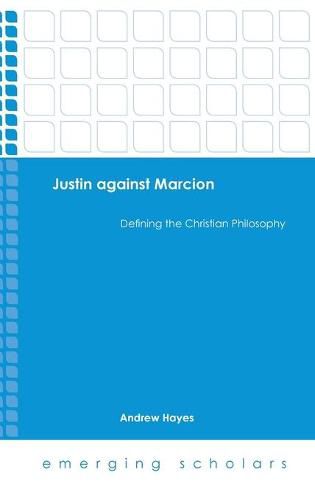Readings Newsletter
Become a Readings Member to make your shopping experience even easier.
Sign in or sign up for free!
You’re not far away from qualifying for FREE standard shipping within Australia
You’ve qualified for FREE standard shipping within Australia
The cart is loading…






In a period where Christianity was only beginning to form a definitive identity, Marcion played a remarkable and generative role. Andrew Hayes takes the measure of his impact on second-century Christianity through a close examination of the topics and structure of Justin Martyr’s writings, especially the Dialogue with Trypho, demonstrating that Justin repeatedly described Christianity in a contra-Marcionite fashion. Arguing that the early part of the Dialogue is in fact a contra-Marcionite prelude to all the major themes in the rest of the piece, Hayes claims that the chief task Justin took for himself was to seize back from Marcion the terms of Christian self-definition. Marcion is thus far more important for Justin’s work than the few places where he is explicitly named might suggest, and Hayes shows that these texts are far from anomalous: they reveal Justin’s deeper agenda of presenting Marcion as a demonic instrument. Students of the second century, of Marcion and of Justin alike, will find much to reevaluate in these pages.
$9.00 standard shipping within Australia
FREE standard shipping within Australia for orders over $100.00
Express & International shipping calculated at checkout
In a period where Christianity was only beginning to form a definitive identity, Marcion played a remarkable and generative role. Andrew Hayes takes the measure of his impact on second-century Christianity through a close examination of the topics and structure of Justin Martyr’s writings, especially the Dialogue with Trypho, demonstrating that Justin repeatedly described Christianity in a contra-Marcionite fashion. Arguing that the early part of the Dialogue is in fact a contra-Marcionite prelude to all the major themes in the rest of the piece, Hayes claims that the chief task Justin took for himself was to seize back from Marcion the terms of Christian self-definition. Marcion is thus far more important for Justin’s work than the few places where he is explicitly named might suggest, and Hayes shows that these texts are far from anomalous: they reveal Justin’s deeper agenda of presenting Marcion as a demonic instrument. Students of the second century, of Marcion and of Justin alike, will find much to reevaluate in these pages.